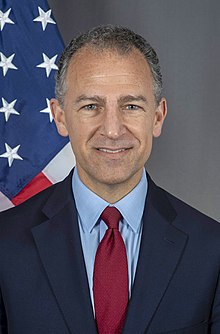List of ambassadors of the United States to the United Nations: Difference between revisions
Enthusiast01 (talk | contribs) No edit summary |
Enthusiast01 (talk | contribs) No edit summary |
||
| Line 24: | Line 24: | ||
| website = {{url|usun.state.gov}} |
| website = {{url|usun.state.gov}} |
||
}} |
}} |
||
The '''United States Ambassador to the United Nations''' is the leader of the U.S. delegation, the [[United States Mission to the United Nations|U.S. Mission]] to the [[United Nations]]. The position is more formally known as the "[[Permanent representative to the United Nations|Permanent Representative]] of the [[United States|United States of America]] to the [[United Nations]], with the rank and status of [[Ambassador Extraordinary and Plenipotentiary]], and Representative of the United States of America in the [[United Nations Security Council|Security Council of the United Nations]]"; it is also known as the U.S. Permanent Representative to the United Nations. |
The '''United States Ambassador to the United Nations''' is the leader of the U.S. delegation, the [[United States Mission to the United Nations|U.S. Mission]] to the [[United Nations]]. The position is more formally known as the "[[Permanent representative to the United Nations|Permanent Representative]] of the [[United States|United States of America]] to the [[United Nations]], with the rank and status of [[Ambassador Extraordinary and Plenipotentiary]], and Representative of the United States of America in the [[United Nations Security Council|Security Council of the United Nations]]"; it is also known as the U.S. Permanent Representative to the United Nations. There is also a Deputy Ambassador who assumes the duties of the ambassador in his or her absence. The deputy ambassador’s position is also subject to Senate confirmation. |
||
The U.S. Permanent Representative, currently [[Jonathan Cohen (diplomat)|Jonathan Cohen]], is charged with representing the United States on the U.N. Security Council and during almost all plenary meetings of the [[United Nations General Assembly|General Assembly]], except in the rare situation in which a more senior officer of the United States (such as the [[United States Secretary of State|U.S. Secretary of State]] or the [[President of the United States]]) is present. Like all [[Ambassadors from the United States|United States ambassadors]], he or she must be nominated by the U.S. [[President of the United States|President]] and [[advice and consent|confirmed]] by the [[United States Senate|Senate]]. |
The U.S. Permanent Representative, currently [[Jonathan Cohen (diplomat)|Jonathan Cohen]], is charged with representing the United States on the U.N. Security Council and during almost all plenary meetings of the [[United Nations General Assembly|General Assembly]], except in the rare situation in which a more senior officer of the United States (such as the [[United States Secretary of State|U.S. Secretary of State]] or the [[President of the United States]]) is present. Like all [[Ambassadors from the United States|United States ambassadors]], he or she must be nominated by the U.S. [[President of the United States|President]] and [[advice and consent|confirmed]] by the [[United States Senate|Senate]]. |
||
Revision as of 05:13, 8 February 2019
| United States Ambassador to the United Nations | |
|---|---|
 Seal of the Department of State | |
 | |
| United States Department of State | |
| Style | Mr. Ambassador (informal) His Excellency (diplomatic) |
| Member of | National Security Council |
| Reports to | Secretary of State |
| Seat | United Nations Headquarters New York City, New York |
| Appointer | The President with Senate advice and consent |
| Term length | No fixed term |
| Formation | December 21, 1945 |
| First holder | Edward Stettinius Jr. |
| Salary | Executive Schedule, level IV |
| Website | usun |
The United States Ambassador to the United Nations is the leader of the U.S. delegation, the U.S. Mission to the United Nations. The position is more formally known as the "Permanent Representative of the United States of America to the United Nations, with the rank and status of Ambassador Extraordinary and Plenipotentiary, and Representative of the United States of America in the Security Council of the United Nations"; it is also known as the U.S. Permanent Representative to the United Nations. There is also a Deputy Ambassador who assumes the duties of the ambassador in his or her absence. The deputy ambassador’s position is also subject to Senate confirmation.
The U.S. Permanent Representative, currently Jonathan Cohen, is charged with representing the United States on the U.N. Security Council and during almost all plenary meetings of the General Assembly, except in the rare situation in which a more senior officer of the United States (such as the U.S. Secretary of State or the President of the United States) is present. Like all United States ambassadors, he or she must be nominated by the U.S. President and confirmed by the Senate.
Many prominent U.S. politicians and diplomats have held the post, including Adlai Stevenson II, George H. W. Bush, Jeane Kirkpatrick, Madeleine Albright, and Nikki Haley. The Ambassador serves at the pleasure of the President, and is therefore appointed by the President.
Jonathan Cohen became the Acting U.S. Ambassador on January 1, 2019, after the resignation of Nikki Haley. In early December 2018, President Donald Trump named Heather Nauert to become the permanent Ambassador, pending Senate confirmation.[1][2] As at January 29, 2019, Nauert‘s nomination has not been made official, and no date has been set for a Senate confirmation hearing and Nauert has retreated from the public gaze.[3]
Cabinet status
Henry Cabot Lodge Jr., a leading moderate Republican who lost his seat in the United States Senate to John F. Kennedy in the 1952 elections, was appointed ambassador to the United Nations in 1953 by Dwight D. Eisenhower in gratitude for the defeated senator's role in the new president's defeat of conservative leader Robert A. Taft for the 1952 Republican nomination and subsequent service as his campaign manager in the general election; Eisenhower raised the ambassadorship to cabinet rank in order to give Lodge direct access to him without having to go through the State Department.[4]
The Ambassadorship continued to hold this status through the Ford, Carter, and Reagan administrations but was removed from cabinet rank by George H. W. Bush, who had previously held the position himself. It was restored under the Clinton administration. It was not a cabinet-level position under the George W. Bush administration (from 2001 to 2009),[5][6] but was once again elevated under the Obama administration, and retained as such by the Trump administration.[7]
Former UN Ambassador (and current National Security Advisor) John R. Bolton has publicly opposed the granting of cabinet-level status to the office, stating "One, it overstates the role and importance the U.N. should have in U.S. foreign policy, second, you shouldn't have two secretaries in the same department".
In December 2018, it was reported by several news organizations that along with the nomination of Heather Nauert to replace Nikki Haley, the Trump administration would once again downgrade the position to non-Cabinet rank.[8]
List of Ambassadors
The following is a chronological list of those who have held the office:
| # | Ambassador | Years served | U.S. President | |
|---|---|---|---|---|
| 1 | 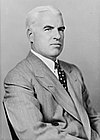
|
Edward Stettinius Jr. | January 17, 1946 – June 3, 1946 | Harry Truman |
| — | 
|
Herschel Johnson | June 3, 1946 – January 14, 1947 Acting | |
| 2 | 
|
Warren Austin | January 14, 1947 – January 22, 1953 | |
| Dwight D. Eisenhower | ||||
| 3 | 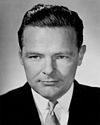
|
Henry Cabot Lodge Jr. | January 26, 1953[9] – September 3, 1960 | |
| 4 | 
|
James Jeremiah Wadsworth | September 8, 1960 – January 21, 1961 | |
| John Kennedy | ||||
| 5 | 
|
Adlai Stevenson | January 23, 1961 – July 14, 1965 | |
| Lyndon B. Johnson | ||||
| 6 | 
|
Arthur Goldberg | July 28, 1965 – June 24, 1968 | |
| 7 | 
|
George W. Ball | June 26, 1968 – September 25, 1968 | |
| 8 | 
|
James Russell Wiggins | October 7, 1968 – January 20, 1969 | |
| 9 | 
|
Charles Yost | January 23, 1969 – February 25, 1971 | Richard Nixon |
| 10 | 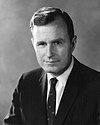
|
George H. W. Bush | March 1, 1971 – January 18, 1973 | |
| 11 | 
|
John A. Scali | February 20, 1973 – June 29, 1975 | |
| Gerald Ford | ||||
| 12 | 
|
Daniel Patrick Moynihan | June 30, 1975 – February 2, 1976 | |
| 13 | 
|
William Scranton | March 15, 1976 – January 19, 1977 | |
| 14 | 
|
Andrew Young | January 30, 1977 – September 23, 1979 | Jimmy Carter |
| 15 | 
|
Donald McHenry | September 23, 1979 – January 20, 1981 | |
| 16 | 
|
Jeane Kirkpatrick | February 4, 1981 – April 1, 1985 | Ronald Reagan |
| 17 | 
|
Vernon A. Walters | May 22, 1985 – March 15, 1989 | |
| George H. W. Bush | ||||
| 18 | 
|
Thomas R. Pickering | March 20, 1989 – May 7, 1992 | |
| 19 | 
|
Edward J. Perkins | May 12, 1992 – January 27, 1993 | |
| Bill Clinton | ||||
| 20 | 
|
Madeleine Albright | January 27, 1993 – January 21, 1997 | |
| 21 | 
|
Bill Richardson | February 18, 1997 – August 18, 1998 | |
| — | 
|
Peter Burleigh | August 18, 1998 – September 7, 1999 Acting | |
| 22 | 
|
Richard Holbrooke | September 7, 1999 – January 20, 2001 | |
| — | 
|
James B. Cunningham | January 20, 2001 – September 19, 2001 Acting |
George W. Bush |
| 23 | 
|
John Negroponte | September 19, 2001 – June 23, 2004 | |
| 24 | 
|
John Danforth | July 23, 2004 – January 20, 2005 | |
| — | 
|
Anne W. Patterson | January 20, 2005 – August 2, 2005 Acting | |
| 25 | 
|
John R. Bolton | August 2, 2005 – December 31, 2006 Recess appointment, not confirmed by the U.S. Senate | |
| — | 
|
Alejandro Daniel Wolff | December 31, 2006 – April 30, 2007 Acting | |
| 26 | 
|
Zalmay Khalilzad | April 30, 2007 – January 22, 2009 | |
| Barack Obama | ||||
| 27 | 
|
Susan Rice | January 26, 2009 – June 30, 2013 | |
| — | 
|
Rosemary DiCarlo | June 30, 2013 – August 5, 2013 Acting | |
| 28 | 
|
Samantha Power | August 5, 2013 – January 20, 2017 | |
| – | 
|
Michele J. Sison | January 20, 2017 – January 27, 2017 Acting |
Donald Trump |
| 29 | 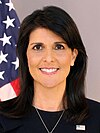
|
Nikki Haley | January 27, 2017 – December 31, 2018 | |
| – | 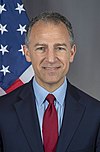
|
Jonathan Cohen | January 1, 2019 – present Acting | |
Living former U.S. Ambassadors to the United Nations
As of July 2024, there are twelve living former U.S. Ambassadors to the United Nation (with all Ambassadors that have served since 2001 still living), the oldest being Edward J. Perkins (served 1992–1993, born 1928). The most recent Ambassador to die was George H. W. Bush (served 1971–1973, born 1924), on November 30, 2018.
- Living former U.S. Ambassadors to the United Nations
-
Andrew Young
served 1977–1979, born March 13, 1932 (age 92) -
Donald McHenry
served 1979–1981, born October 13, 1936 (age 87) -
Thomas R. Pickering
served 1989–1992, born November 5, 1931 (age 92) -
Edward J. Perkins
served 1992–1993, born June 8, 1928 (age 96) -
Madeleine Albright
served 1993–1997, born May 15, 1937 (age 87) -
Bill Richardson
served 1997–1998, born November 15, 1947 (age 76) -
John Negroponte
served 2001–2004, born July 21, 1939 (age 84) -
John Danforth
served 2004–2005, born September 5, 1936 (age 87) -
John R. Bolton
served 2005–2006, born November 20, 1948 (age 75) -
Zalmay Khalilzad
served 2007–2009, born March 22, 1951 (age 73) -
Susan Rice
served 2009–2013, born November 17, 1964 (age 59) -
Samantha Power
served 2013–2017, born September 21, 1970 (age 53) -
Nikki Haley
served 2017-2018, born January 20, 1972 (age 52)
See also
Notes
- ^ "Trump picks Heather Nauert as new US envoy to UN". BBC News. December 7, 2018. Retrieved January 1, 2019.
- ^ Santucci, John (December 7, 2018). "Trump says he'll nominate Heather Nauert as UN ambassador". ABC News. Retrieved January 1, 2019.
- ^ After nearly 2 months, there's no sign of urgency to confirm Trump's UN pick
- ^ Hubbard, James P. (2011). The United States and the End of British Colonial Rule in Africa, 1941–1968. Jefferson City, NC: McFarland & Company. p. 172. ISBN 978-0-7864-5952-0.
- ^ Kelemen, Michele (December 1, 2008). "U.N. Envoy Nominee Rice Known As Smart, Tough". National Public Radio. Retrieved January 21, 2009.
The head of the United Nations Foundation, a Washington-based advocacy group, released a statement praising Rice as well as Obama's decision to make the post of U.N. ambassador a Cabinet-level position once again—as it was during the Clinton years.
- ^ Cooper, Helene (November 20, 2008). "Clinton Decision Holding Up Other Obama Choices". New York Times. Retrieved February 9, 2009.
Ms. Rice could get the post of United States ambassador to the United Nations, a cabinet-level position under President Clinton. President Bush downgraded the position when he came into office
- ^ Walker, Hunter. "President Trump announces his full Cabinet roster." Yahoo News. 2017-02-07. Retrieved 2017-02-08.
- ^ Kristen Welker; Geoff Bennett; Daniel Barnes (2018-12-07). "U.N. ambassador to no longer be Cabinet-level position". NBC News. Retrieved 2018-12-07.
- ^ Chesly Manly (January 27, 1953). "Lodge Asks FBI to Screen All U.S. Aids [sic] on U.N." Chicago Tribune. Chicago Tribune Press Service.

